On September 26…
“I don’t want the talents of any American to go to waste. I know that there are those who want to turn everything over to the government. I don’t at all. I want the individuals to meet their responsibilities. And I want the states to meet their responsibilities.”
~Sen. John F. Kennedy
First Presidential Debate 1960
“We are for programs that will expand educational opportunities; that will give to all Americans their equal chance for education, for all of the things which are necessary and dear to the hearts of our people.”
~Vice President Richard M. Nixon
First Presidential Debate 1960
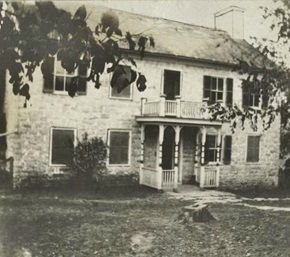
1820 – Pioneering frontiersman Daniel Boone died quietly in his sleep at his son’s home (shown above) near present-day Defiance, Missouri. He was 86.
His last words were, “I’m going now. My time has come.”
Made a legend in his own time by John Filson’s Boone Autobiography and Lord Byron’s depiction of him as the quintessential frontiersman in the book Don Juan, Boone became a symbol of the western pioneering spirit for many Americans.
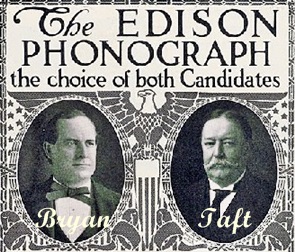
1908 – An ad for the Edison Phonograph appeared in The Saturday Evening Post.
The phonograph offered buyers wax cylinders recorded by the Democratic candidate, William Jennings Bryan, and the Republican candidate, William Howard Taft.
The two-minute duration of these records forced an eager Bryan and a reluctant Taft to excerpt their nuanced speeches and get to the point.
You could hear Bryan speak on “The Security of Bank Deposits,” and Taft talk about the “Rights and Progress of the Negro.”
Thus began the 20th century’s march to the sound bite … and the redefinition of political communications for all time.
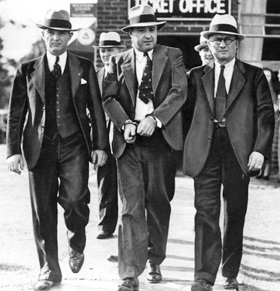
1933 – As gangster George “Machine Gun” Kelly surrendered to the FBI, he allegedly cried out, “Don’t shoot, G-Men! Don’t shoot, G-Men!” The term, which had applied to all federal investigators, became synonymous with FBI agents.
At least that was the story concocted by FBI chief J. Edgar Hoover. What a shame that very little of it is true.
According to Sergeant William J. Raney, the arresting officer, Kelly actually said, “Okay, boys,” dropping the gun to the floor. “I’ve been waiting all night for you.”
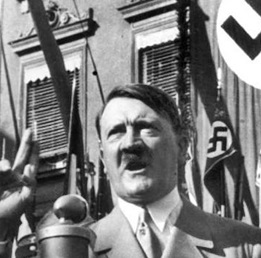
1938 – Adolf Hitler issued an ultimatum to Czechoslovakia, demanding that Germans living in the Sudetenland section of Czechoslovakia be reunited with their homeland.
Hitler denounced Czechoslovakia as being a fraudulent state that was in violation of international law’s emphasis of national self-determination.
In that speech, Hitler gave Czechoslovakia a deadline of September 28 to cede the Sudetenland to Germany or face war.
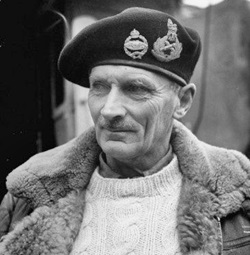
1944 – Operation Market-Garden, a plan to seize bridges in the Dutch town of Arnhem, failed, as thousands of British and Polish troops were killed, wounded, or taken prisoner.
British Gen. Bernard Montgomery (shown above) conceived an operation to take control of bridges that crossed the Rhine River, from the Netherlands into Germany, as a strategy to make “a powerful full-blooded thrust to the heart of Germany.”
The Germans quickly destroyed the railroad bridge and took control of the southern end of the road bridge. The Allies struggled to control the northern end of the road bridge, but soon lost it to the superior German forces.
The only thing left was retreat-back behind Allied lines. But few made it. Of more than 10,000 British and Polish troops engaged at Arnhem, only 2,900 escaped.
The disastrous operation was the inspiration for the 1977 film, A Bridge Too Far.
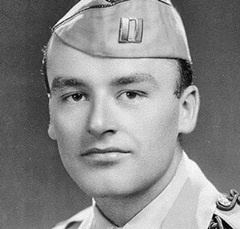
1945 – Lt. Col. Peter Dewey, a U.S. Army officer with the Office of Strategic Services in Vietnam, was shot and killed in Saigon.
Dewey was the head of a seven-man team sent to Vietnam to search for missing American pilots and to gather information on the situation in the country after the surrender of the Japanese.
He would prove to be the first of nearly 59,000 Americans killed in Vietnam.
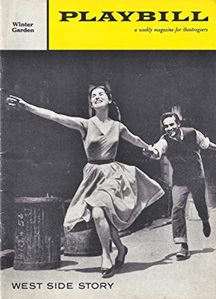
1957 – West Side Story, composed by Leonard Bernstein, opened at the Winter Garden Theatre on Broadway.
For the groundbreaking musical, Bernstein provided a propulsive and rhapsodic score that many celebrate as his greatest achievement as a composer.
In 1961, a film version starring Natalie Wood and Richard Beymer, was an enormous hit and took home 10 Academy Awards, including Best Picture.
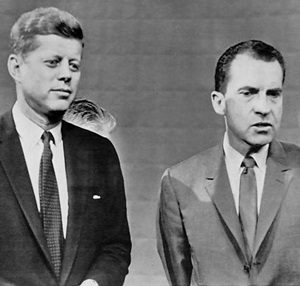
1960 – For the first time in U.S. history, a debate between major party presidential candidates was shown on television.
The presidential hopefuls, John F. Kennedy, Democratic senator of Massachusetts, and Richard M. Nixon, the vice president of the United States, met for the first of four televised debates.
Nixon was considered to have the upper hand due to his knowledge of foreign policy and proficiency in radio debates.
However, because of his unfamiliarity with the new format of televised debates, factors such as his underweight and pale appearance, the suit color blending in with the debate set background, and refusing television makeup, led to his defeat.
Many observers have regarded JFK’s win over Nixon in the first debate as a turning point in the election
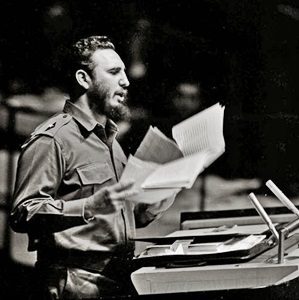
1960 – Fidel Castro delivered a 4 ½ hour speech to the U.N. General Assembly in New York City.
If you would like a transcript, I can point you in the right direction.
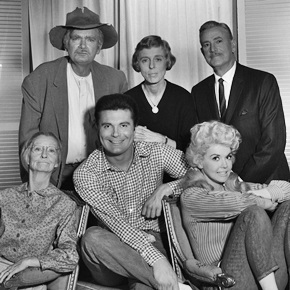
1962 – The Beverly Hillbillies premiered on CBS. The series ran for nine years.
Although the program was savaged by critics as “strained and unfunny” and “painful to sit through,” The Beverly Hillbillies ranked among the top 20 most-watched programs on television for eight of its nine seasons, twice ranking as the number one series of the year.
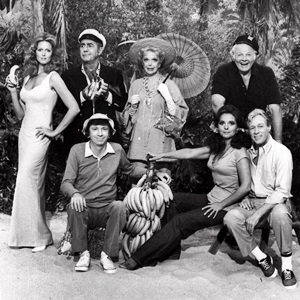
1964 – Gilligan’s Island premiered on CBS. While it felt like the series went on forever, it only lasted three years … but here are the questions of the day:
1/ If the survivors had set out to take a “three-hour tour,” why did they have so many changes in wardrobe?
2 / The castaways built framed huts with thatched grass sides and roofs, along with bamboo closets strong enough to withstand hurricane-force winds and rain, but they couldn’t repair a hole in the side of the damn ship?
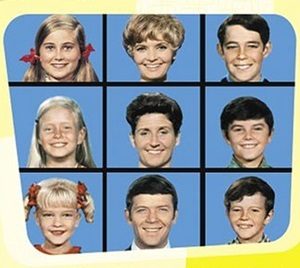
1969 – The Brady Bunch premiered on ABC, starting a five-year run.
While the series was never a critical or ratings success during its original run (never finishing higher than #31), it become a popular staple in syndication, especially among children and teenaged viewers.
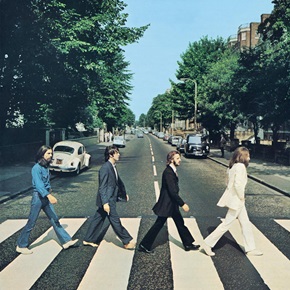
1969 – The Beatles released the Abbey Road album.
The recording sessions for the album were the last in which all four Beatles participated. Although Let It Be was the final album the Beatles released before the band’s dissolution in April 1970, most of that album had been recorded before the Abbey Road sessions began.
The image of the Beatles crossing the street on the Abbey Road cover has become one of the most famous and imitated in recording history.
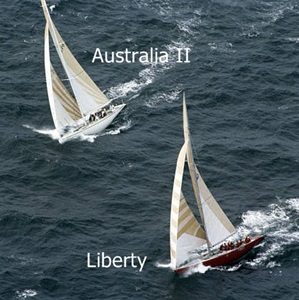
1983 – The longest winning streak in sports – 132 years – was broken.
It was the America’s Cup race and the United States team was expected to maintain their title; one they were defending for the 25th time.
In the seventh and deciding match race, challenger Australia II defeated the American Liberty by 41 seconds.
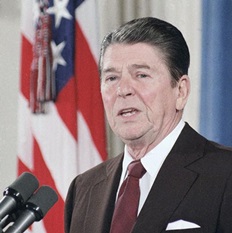
1984 – President Ronald Reagan vetoed HR 4868, which would have imposed a series of sanctions, such as barring importation of South African coal, steel and agricultural products and ending landing rights in the United States for the government-owned South African Airways.
The measure also threatened future sanctions if the Pretoria government failed to move to end the “apartheid” system of racial segregation.
The U.S. House and Senate easily overrode Reagan’s veto. Reagan readily accepted the congressional action and promised to implement the law. In a statement issued by the White House after the vote, Reagan said the debate between himself and Congress “was not whether to oppose apartheid but, instead, how best to oppose it and how best to bring freedom to that troubled country.”
Nevertheless, Reagan insisted he had been correct in opposing sanctions because “they hurt the very people they are intended to help.”
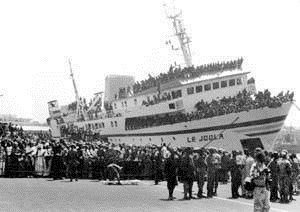
2002 – MV Le Joola, a ferry from Senegal, capsized off the coast of Gambia.
Although the ship was designed to carry a maximum of 580 passengers and crew, an estimated 1,863 passengers and crew of 44 are believed to have been on board
Only 64 were rescued, making it the second-worst non-military maritime disaster in history.
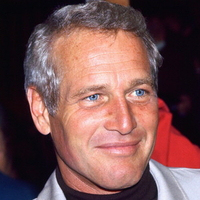
2008 – Paul Newman, one of the leading movie stars of the 20th century, died at the age of 83 from cancer at his home in Westport, Connecticut.
In a career spanning more than five decades, Newman made over 65 movies, including the classics Butch Cassidy and The Sundance Kid, Harper, Hombre and The Sting.
He was nominated nine times for Best Actor Academy Awards: Cat On A Hot Tin Roof, The Hustler, Hud, Cool Hand Luke, Absence of Malice, The Verdict, Nobody’s Fool, and finally won for The Color Of Money.
In one of his final film appearances, Newman was nominated for Best Supporting Actor in The Road To Perdition.
As reported in The New York Times, Newman’s talent as an actor was drawn from his “physical grace, unassuming intelligence and good humor that made it all seem effortless.”
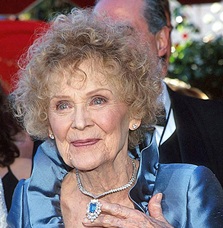
2010 – Actress Gloria Stuart died of natural causes at the age of 100.
She had film roles in The Old Dark House (1932), The Invisible Man, and The Three Musketeers – all of them in the 1930s – but she is best known for her film role as the 101-year-old Rose Dawson Calvert in the Academy Award-winning film Titanic – for which she was nominated for an Academy Award as Best Supporting Actress.
Compiled by Ray Lemire ©2018 RayLemire.com Streamingoldies.com. All Rights Reserved.